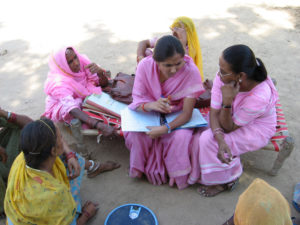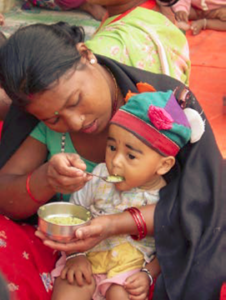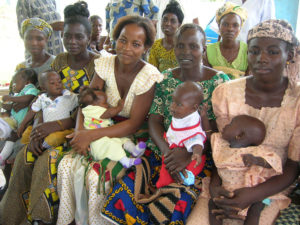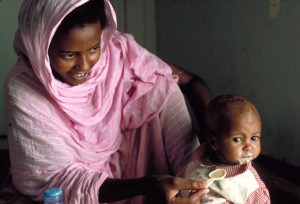Working Groups
CORE Group’s six technical and cross-cutting Working Groups are led by chairs and co-chairs from our Member and Associate Organizations. They provide technical leadership and facilitate the group to further the strategic development of standards, activities and products that will advance community-focused health programs and technical agenda. Our Working Groups are: Systems for Health; Monitoring & Evaluation; Nutrition, Reproductive, Maternal, Newborn, Child & Adolescent Health; and Social & Behavior Change. CORE Group’s Interest Groups work in similar form as Working Groups but are convened based on need. Our Interest Groups are: Disability Inclusive Health Technical Advisory Group; Humanitarian-Development Task Force; WASH and Health, Noncommunicable Diseases Interest Group, and One Health.
 Vision
Vision
The Systems for Health Working Group seeks to promote people-centered, Community-Inclusive Systems for Health, which deliver expanding packages of health interventions tailored to specific contextual needs and opportunities, connecting social and health care structures, valuing prevention, health promotion, and the agency of communities to own their future.
We are interested in cross-cutting issues, which contribute to strengthening systems for health, such as:
- The full integration of community-based systems into national health systems and strategies
- Community health human resources
- Community management structures
- Social capital
- Civil society engagement
- Social accountability and health systems’ responsiveness
A collaborative publication included in the BMJ Global Health Supplement on The Alma Ata Declaration at 40 now reflects our belief in the evidence-based concept of Community-Inclusive Systems for Health as an organizing platform to advance these issues. Join us as a member, find out what workstream you can contribute to (currently active Nov 2019), Social Accountability, Human Resources for Community Health / CHWs, Global Health Agenda Advocacy for Community-Inclusive Systems for Health, or mobilize to start a new workstream.
Co-Chairs
- Cora Nally, PHD(c), MPH, Americares
- Kristen Mallory, Children International
- Dr. Adugna Kebede, Action Against Hunger
Staff Representative
- Rachel Wax, CORE Group
 Vision
Vision
The Nutrition Working Group underscores the critical role of nutrition in maternal and child survival and health through dissemination of state-of-the-art information and approaches essential for quality nutrition programming.
Co-Chairs
- Diana Allotey, Vitamin Angel Alliance Inc
- Charlotte Block, CARE
- Albertha Nyaku, Results for Development
Staff Representative
- Chantal McGill, CORE Group
 Vision
Vision
The RMNCAH Working Group synthesizes current research, best practices, and country experiences to provide CORE Group partner organizations with technical updates in the areas of women and maternal health; newborn and child health; and family planning and reproductive health.
Co-Chairs
- Feven Tassew Mekuria, CARE
- Rondi Anderson, Project HOPE
- Emma Virginia Clark, Abt Global
- Jimmy Nzau, EngenderHealth
Staff Representative
- Dr. Brooke Farrenkopf, CORE Group
 Vision
Vision
The SBC Working Group contributes to improved maternal and child health outcomes by strengthening the capacity of CORE members to design and implement effective social and behavioral change strategies while documenting and disseminating valuable experiences.
Co-Chairs
- Lisa Sherburne, JSI
- Barbara Muffoletto, CURAMERICAS
- Joel Mercado, World Vision
Staff Representative
- Barbara Nayebare, CORE Group
Vision
In 2018, CORE Group prioritized a Disability Inclusive Health agenda and established the Disability Inclusive Health Technical Advisory Group (TAG), based on requests from the global practitioner community, to address gaps in disability inclusivity in health programming and advocacy. The Disability Inclusive Health Technical Advisory Group is open to all CORE Group members and associates, as well as non-members NGOs, CSOs, academic institutions, national governments, UN, donors, and policy makers’ representatives committed to work toward “Leaving No One Behind” and “Health for All” along the continuum from humanitarian relief to development. The TAG is committed to include the voice and work of people living with disabilities and disabled people organizations in the TAG.
Disability-Inclusive Health TAG Objectives
- Promote learning on disability inclusive health and rehabilitation;
- Facilitate collaboration to promote disability inclusive health initiatives;
- Advocate for disability inclusive health policies; and
- Advocate for increased resources for disability inclusive health programming.
Co-Chairs
- Hamza Alzahran, Special Olympics International
- Nyasha Derera, Special Olympics International
Staff Representative
- Lisa Hilmi, CORE Group
Vision
Noncommunicable diseases (NCDs) account for over 60% of deaths worldwide and include but are not limited to cancer, diabetes, cardiovascular disease, chronic lung disease, mental illness, and injuries. NCDs cause millions of preventable deaths, particularly in less developed nations, where 4 out of 5 of these deaths occur. Most of these people, particularly in developing countries, lack access to the preventative measures or lifesaving treatments proven to be effective against NCDs. We already have many effective solutions, but we need to put them into action. CORE Group’s NCD Interest Group works to convene those working to treat and prevent NCDs at the community level, to share resources, events, and vital information to improve their work.
Co-Chairs
Barbara L. Smith, MPH, CPDM, Project Hope
Staff Representative — TBC
Learn More (Working Group pages require free login.)

